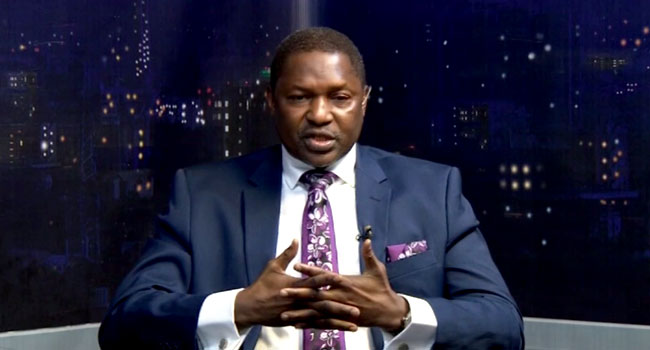Malami On Electoral Act: Deletion Of Section 84(12) Is Still Work In Progress

The Attorney General of the Federation and Minister of Justice, Abubakar Malami, has said that the deletion of section 84 Subsection 12 of the Electoral Act 2022 is still a work in progress and is being considered as such.
He said this while fielding questions from State House correspondents after the weekly Federal Executive Council meeting on Wednesday.
According to him, while the possibility of appeal is not in doubt, government creators and the Law Reform Commission responsible for the codification and gazetting of the laws are collaborating with the Office of the Attorney General to ensure that any addition made to the law is in line with the provisions of the law.
READ ALSO: Court Orders AGF To Remove Section 84(12) From Electoral Act
Malami’s comments come a few days after the Federal High Court in Umuahia, Abia State, declared Section 84 (12) of the amended Electoral Act illegal and ordered the Attorney General of the Federation to delete the section.
President Muhammadu Buhari had earlier sent a letter to the National Assembly asking them to delete the section, arguing that it would deprive political appointees of their right to vote and be voted for.
Justice Evelyn Anyadike, while delivering judgement on the matter said political appointees could only resign 30 days to an election.
The Judge stressed that the section was unconstitutional, invalid, illegal, null, void, and of no effect whatsoever and ought to be struck down.
According to her, the section could not stand when it is in violation of the clear provisions of the Constitution.
In the suit marked FHC/UM/CS/26/2022, the judge held that Sections 66(1)(f), 107(1)(f), 137(1)(f), and 182(1)(f) of the 1999 Constitution already stipulated that appointees of government seeking to contest elections were only to resign at least 30 days to the date of the election. Justice Anyadike said any other law mandating such appointees to resign or leave office at any time before that was unconstitutional, invalid, illegal null, and void to the extent of its inconsistency to the clear provisions of the tenants of the law.
After the judgement, the plaintiff’s counsel, Emeka Ozoani, told newsmen that by this judgement, the National Assembly was not required to further make any amendments to the section.
He said the finality of the judgement was that Section 84(12) of the Electoral Act was no longer in existence or part of the Electoral Act.
However, the Senate on Wednesday debated the controversial ruling of the Federal High Court, an argument that saw lawmakers pitch their tents on various divides.
This comes barely one day after the Nigerian Bar Association, NBA, had warned Nigerians, particularly lawyers, to be wary of making unguarded comments over judgments of courts.
The NBA in a statement issued by the president, Olumide Akpata, called on legal practitioners and the public to exercise restraint after the ruling in favour of the removal of Section 84(12) of the Electoral Act with immediate effect.
Mr Akpata reiterated that there are legal and constitutional avenues to challenge unfavorable Judgments, adding that lawyers and the generality of Nigerians are therefore enjoined to explore these avenues rather than resorting to unwarranted and counterproductive attacks on Judges and the Judiciary.
He, however, insisted that the various courts across the nation should follow due process in the execution of their duties to mitigate any form of breakdown of law and order which is certain to occur when the generality of Nigeria ultimately loses confidence in the court system.







